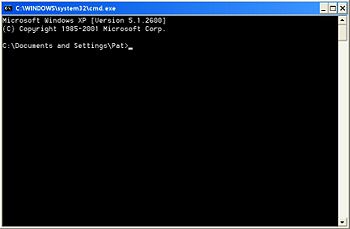Command line: Difference between revisions
Jump to navigation
Jump to search

imported>Pat Palmer (adding a photo for emphasis) |
mNo edit summary |
||
| Line 1: | Line 1: | ||
{{subpages}} | {{subpages}} | ||
{{Image|Dos window.jpg|right|350px|Dos command line window invoked by entering "cmd" in the Windows XP Run box.}} | {{Image|Dos window.jpg|right|350px|Dos command line window invoked by entering "cmd" in the Windows XP Run box.}} | ||
'''Command lines''' are widely used in most advanced computer operating systems as one way of interacting with the system. Until the advent of graphical operating systems and the WIMP paradigm, most operating systems allowed interaction primarily though a command line. The command line, prompt or shell is a place where textual commands can be entered into the computer, which then processes them and responds. The shells of which command lines form a part have a wide variety of features. Some include auto-completion of command and file names. | '''Command lines''' are widely used in most advanced computer operating systems as one way of interacting with the system. Until the advent of graphical operating systems and the WIMP paradigm, most operating systems allowed interaction primarily though a command line. The command line, prompt or shell is a place where textual commands can be entered into the computer, which then processes them and responds. The shells of which command lines form a part have a wide variety of features. Some include auto-completion of command and file names.[[Category:Suggestion Bot Tag]] | ||
Latest revision as of 16:01, 30 July 2024
Command lines are widely used in most advanced computer operating systems as one way of interacting with the system. Until the advent of graphical operating systems and the WIMP paradigm, most operating systems allowed interaction primarily though a command line. The command line, prompt or shell is a place where textual commands can be entered into the computer, which then processes them and responds. The shells of which command lines form a part have a wide variety of features. Some include auto-completion of command and file names.
